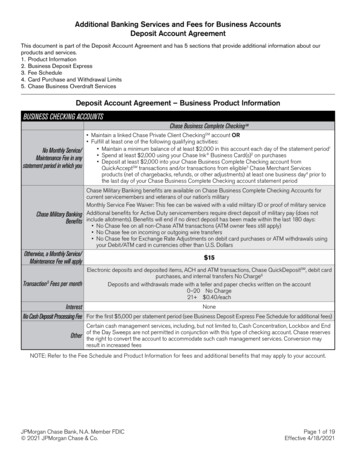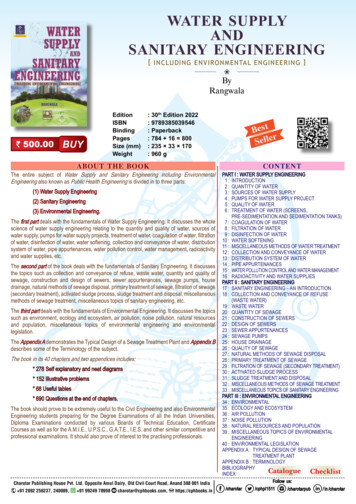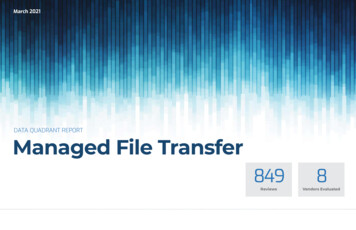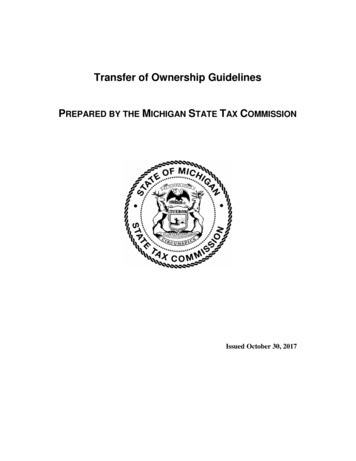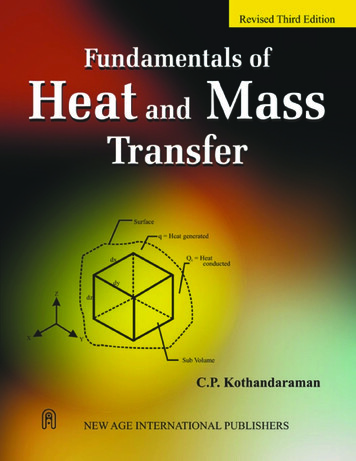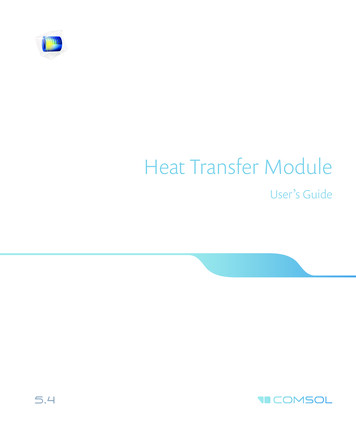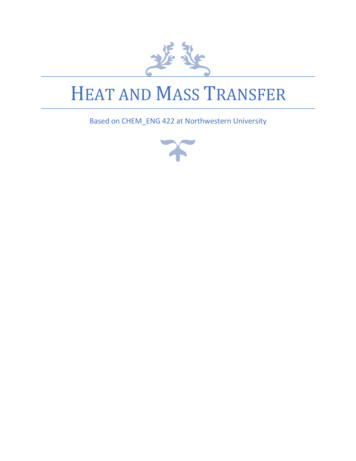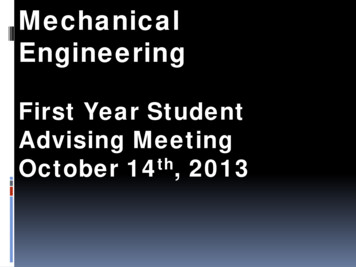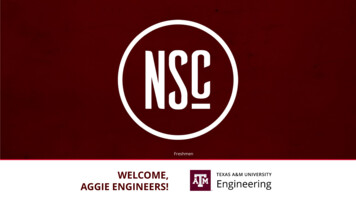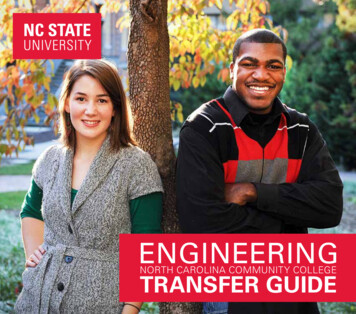
Transcription
ENGINEERINGNORTH CAROLINA COMMUNITY COLLEGETRANSFER GUIDE1
THANK YOU!Located in Raleigh, North Carolina, NC State University’s College of Engineering is a leadingresearch, teaching and outreach engineering and computer science college offering 18bachelor’s, 21 master’s and 13 doctoral degree programs. Annual enrollment exceeds 10,000students, with more than 6,000 undergraduates and nearly 3,000 graduate students. TheCollege also offers 16 online engineering master’s degrees.We appreciate your interest in pursuing a degree inengineering or computer science and are ready to help youaccomplish your goal. Each year, more than 25 percent ofthe students receiving engineering degrees from NC StateUniversity began their education at another institution. Youwill find information on College of Engineering programs,curricula, student organizations, and much more bybrowsing the website at www.engr.ncsu.edu.We would like to invite you, your parents and your friends toattend either the College of Engineering Open House heldin the spring or the University Open House held in the fall.Both are wonderful opportunities to meet with faculty, staffand students in the College of Engineering and to tour ourteaching and research facilities.2CENTENNIAL CAMPUS
TABLE OF CONTENTS46THE BASICSto NC State. As you turn the followingApplication Deadlinespages, you'll find information onwhich courses are required,PLANNING FOR THE FUTUREWHAT CAN I TAKE NOW?Engineering Degree RequirementsCourse DescriptionsUniversity RequirementsGEP Requirements18Make sure you're on track to transferTransfer RequirementsDegree Options8THE BASICSFREQUENTLY ASKED QUESTIONSapplication deadlines, and GPAinformation for your intended area ofstudy. We're here to help with asuccessful transferto the university.
WHAT YOU NEEDSince transfer admissions into the College are very competitive, meeting the eligibility requirements onlyguarantees that a transfer application may be considered; it does not guarantee admission. Students who aresuccessful in admission often have grades well above these minimums.WHAT'S NEXT?For a comprehensive list of North Carolina community college course equivalencies, visit http://bit.ly/2c75c3j.The NC State course number is written in red for your reference; North Carolina community college courseSTEP 1Talk to your North Carolina community college advisor.Visit oucc.dasa.ncsu.edu/engineering-coe to learn more.STEP 2Plan ahead and apply early.www.admissions.ncsu.edu/applySTEP 3If you still have questions, send an email to an NC Stateengineering advisor at engineering@ncsu.edu.numbers are written in bold. A course taken at another institution must be equivalent to the exact NC Statecourse and completed with a grade of C- or better. If NC State courses are taken, the overall NC State GPA mustbe at least a 2.0. Core courses (chemistry, calculus and physics), also known as C-wall courses, require at least a C.1.2.3.4.30 credit hours or more of transferable collegelevel courses3.0 or higher cumulative GPA*Minimum 4 credit hours of English composition,4 credits ENG 101 (ENG 111 in combination withENG 112, ENG 113, or ENG 114 to fulfill theEnglish requirement (total 4 credits))College chemistry course with lab, 4 creditsCH 101 102 (CHM 135, 151 or 131 and 131 A)Calculus I, 4 credits MA 141 (MA 271)Calculus II, 4 credits MA 241 (MA 272)Minimum 2.5 math GPA over last two mathcourses at Calculus I MA 141 level or higher(MAT 271)9. Calculus-based Physics I with lab,10. 4 credits PY 205 and PY 206 (PHY 251)5.6.7.8.*The requirements above are minimums for eligibility to apply for transfer admission into the College of Engineering. Students who aresuccessful in admission often have grades well above these minimums. As an example, the middle 50% of successful applicants in recentyears have had GPA's from 3.4-3.8. Due to high demand, some programs are much more competitive, and preference is given to higherGPAs. In some cases, applicants with 3.0 GPA 3.5 may increase their competitiveness with strong performances in additional technicalcoursework (e.g., Calculus III, Physics II, Engineering Statics, Chemistry II, Organic Chemistry, etc.). To select the appropriate courses, referto your intended NC State engineering degree requirements.4TRANSFERAPPLICATION DEADLINE:February 15th(April 15th notification)INTERNATIONAL TRANSFERAPPLICATION DEADLINE:January 15th(rolling notification)NOTE: A pending decision for transfer applicants will require all official final transcripts by June 1 including grades for completed springcoursework. Those applicants will receive a decision by June 15. Summer coursework in-progress cannot be considered to meet admissionrequirements for the fall semester. The College of Engineering does not offer spring transfer admissions.5
WHAT ARE MY DEGREE OPTIONS?PLANNINGFOR THEFUTURENC State offers 18bachelor's degreeprograms.CONCENTRATION (optional)DEPARTMENTDEGREEBIOLOGICAL ANDAGRICULTURALENGINEERING (BAE)Biological Engineering (BE)BIOMEDICALENGINEERING (BME)Biomedical Engineering(BME)—CHEMICAL ANDBIOMOLECULARENGINEERING (CBE)Chemical Engineering (CHE) BiomanufacturingScience Biomolecular Honors Nanoscience SustainableEngineering, Energyand EnvironmentCIVIL, CONSTRUCTION,AND ENVIRONMENTALENGINEERING (CCEE)Civil Engineering (CE)—Construction Engineering(CON) (concentrationrequired) General Construction Mechanical ConstructionEnvironmental Engineering(ENE)—COMPUTER SCIENCE(CSC)Computer Science (CSC) Game Development—ELECTRICAL ANDCOMPUTERENGINEERING (ECE)Computer Engineering (CPE)——Electrical Engineering (EE) Renewable ElectricEnergy SystemsFOREST BIOMATERIALS(FB)Paper Science andEngineering (PSE)——INDUSTRIALAND SYSTEMSENGINEERING (ISE)Industrial Engineering (IE)—Health Systems(Certificate Program)MATERIALS SCIENCEAND ENGINEERING(MSE)Materials Science andEngineering (MSE) Biomaterials Nanomaterials—MECHANICALAND AEROSPACEENGINEERING (MAE)Aerospace Engineering (AE)——Mechanical Engineering (ME)—NUCLEARENGINEERING (NE)Nuclear Engineering (NE)——TEXTILE ENGINEERING,CHEMISTRY ANDSCIENCE (TECS)Textile Engineering (TE)(concentration required) Chemical Processing Information Systems Product Engineering— hanics—Civil - Coastal Engineeringand Water Resources,Computing and Systems,Construction Engineering,Environmental Engineering,Geotechnical Engineering,Structural Engineering andTransportation urricula7
WHAT CAN ITAKE NOW?Many courses at your collegetransfer to NC State. Exploreyour course options.The university also requiresstudents to fulfill GeneralEducation Programrequirements.
ENGINEERING DEGREE REQUIREMENTSThe North Carolina Community College System offers a number of courses that fulfill requirements within the NCState engineering curricula. Follow these two steps to create your own personalized community college/NC Statecurriculum:§ Find your intended semester-by-semester plan at https://oucc.dasa.ncsu.edu/engineering-coe§Use the comprehensive list of North Carolina community college/NC State equivalencies athttp://bit.ly/2c75c3j to select courses that fulfill degree requirements within your semester-bysemester plan.Below is a list of North Carolina community college courses commonly selected by transfer students to fulfillvarious degree requirements. Only North Carolina community college options are listed; additional options maybe available at NC State. On lines marked with a red arrow ( ), students choose one course.AEROSPACE ENGINEERINGDFT 170 § ECO 251 § EGR 150 § EGR 220 § MAT 273§ MAT 285 § PHY 252 § CSC 134CHEMICAL ENGINEERINGECO 251 § EGR 150 § MAT 273 § MAT 285 § PHY 252§ CHM 251 § CHM 252 CHM 136 or CHM 152BIOLOGICAL ENGINEERINGECO 251 § EGR 150 § EGR 220 § MAT 273 § MAT 285§ PHY 252 BIO 111 or BIO 112 CHM 136, CHM 152, CHM 132, or CHM 251CIVIL ENGINEERINGDFT 170 § ECO 251 § EGR 150 § EGR 220 § MAT 273§ MAT 285 § PHY 252 § COM 231 BIO 111, BIO 112, GEL 111 or GEL 120 CSC 148, CSC 151, CSC 134, or CSC 136BIOMEDICAL ENGINEERINGBIO 111 § CHM 251 § ECO 251 § EGR 150 § EGR 220§ MAT 273 § MAT 285 § PHY 25210COMPUTER ENGINEERINGECO 251 § EGR 150 § MAT 273 § PHY 252 § COM 231COMPUTER SCIENCEMATERIALS SCIENCE AND ENGINEERINGECO 251 § EGR 150 § MAT 273 § PHY 252 § CSC 151 CHM 136, CHM 152, AST 111, AST 151, AST 152,BIO 110, BIO 111, BIO 112, BIO 120, BIO 145, BIO 163,BIO 165, BIO 168, BIO 243, GEL 111, GEL 113, GEL 120,or GEL 230CHM 132 § ECO 251 § EGR 150 § MAT 273 § MAT 285§ PHY 252 CHM 136 or CHM 152 CSC 151 or CSC 134MECHANICAL ENGINEERINGCONSTRUCTION ENGINEERING AND MANAGEMENT GENERALDFT 170 § ECO 251 § EGR 150 § EGR 220 § MAT 273§ PHY 252 § COM 231 CSC 151 or CSC 134 BIO 111, GEL 111, GEL 120, MAT 280, MAT 285, CHM 136,or CHM 152CONSTRUCTION ENGINEERING AND MANAGEMENT MECHANICALACC 121 § DFT 170 § ECO 251 § EGR 150 § EGR 220§ MAT 273 § MAT 285 § PHY 252 CSC 151 or CSC 134 SOC 240, SOC 230, or POL 130ELECTRICAL ENGINEERINGECO 251 § EGR 150 § MAT 273 § PHY 252 § COM 231ENVIRONMENTAL ENGINEERINGDFT 170 § BIO 111 § ECO 251 § EGR 150 § EGR 220§ MAT 273 § MAT 285 § PHY 252 § COM 231 CHM 136 or CHM 152 CSC 151 or CSC 134DFT 170 § ECO 251 § EGR 150 § EGR 220 § MAT 273§ MAT 285 § PHY 252 § CSC 134MECHANICAL ENGINEERING SYSTEMS (HAVELOCK)DFT 170 § ECO 251 § EGR 150 § EGR 220 § MAT 273§ MAT 285 § PHY 252 CSC 134 or CSC 136MECHATRONICS (UNC ASHEVILLE)ECO 251 § EGR 150 § EGR 220 § MAT 273 § PHY 252NUCLEAR ENGINEERINGECO 251 § EGR 150 § EGR 220 § MAT 273 § MAT 285§ PHY 252 COM 231, FL 111, FL 112, or FL 221NOTE: FL 111, 112, 221: Any foreign language at the 111,112, and 221 levelPAPER SCIENCE AND ENGINEERINGCHM 251 § CHM 252 § ECO 251 § EGR 150 § MAT 273§ MAT 285 § PHY 252 CHM 136 or CHM 152TEXTILE ENGINEERINGINDUSTRIAL ENGINEERINGECO 251 § EGR 150 § EGR 220 § MAT 273 § PHY 252 MAT 280 or MAT 285DFT 170 § ECO 251 § EGR 150 § EGR 220 § MAT 273§ MAT 285 § PHY 252 CHM 136 or CHM 152 (only if pursuing TE-Chemical Processing)Visit http://bit.ly/2c75c3j for more information.11
COURSE DESCRIPTIONSACC 121 (ACC 200) BIO 145 (PB 360)Principles of Accounting IIEcologyCHM 151 (CH 101 102)*General Chemistry IECO 251 (EC 201)*Principles of MicroeconomicsGEL 113 (MEA 202 211)Historical GeologyMAT 285 (MA 341)Differential EquationsAST 111 (PY 123)*Descriptive AstronomyBIO 163 (BIO 212)Basic Anatomy and PhysiologyCHM 152 (CH 201 202)*General Chemistry IIEGR 150 (E 101)Introduction to EngineeringGEL 120 (MEA 101 110)Physical GeologyPHY 251 (PY)*General Physics IAST 151 (PY 123)*General Astronomy IBIO 165 (BIO 212)Anatomy and Physiology ICHM 251 (CH 221 222)Organic Chemistry IEGR 220 (MAE 206 or CE 214)Engineering StaticsGEL 230 (MEA 300)Environmental GeologyPHY 252* (PY 208 PY 209)General Physics IIAST 152 (PY 124)General Astronomy IIBIO 168 (BIO 212)Anatomy and Physiology ICHM 252 (CH 223 224)Organic Chemistry IIJOU 216 (ENG 215)Writing Mass MediaPOL 130 (PS 202)State and Local GovernmentBIO 110 (BIO 105)*Principles of BiologyBIO 243 (MEA 220)Marine BiologyCOM 231 (COM 110)*Public SpeakingENG 111, 112, 113, 114 (ENG 101)*ENG 111 in combination withENG 112, 113, or 114 equalsENG 101, Academic Writingand Research. ENG 111 and112 are UGETC coursesMAT 271 (MA)*Calculus ISOC 230 (SOC 305)Race and Ethnic RelationsBIO 111 (BIO 183)*General Biology ICHM 132 (CH 220)Organic/BiochemistryCSC 134 (CSC 114)C ProgrammingMAT 272 (MA)Calculus IISOC 240 (SOC 301)Social PsychologyBIO 112 (BIO 181)*General Biology IICHM 135 (CH 101 102)Survey of Chemistry ICSC 151 (CSC 116)JavaBIO 120 (PB 200)Introductory BotanyCHM 136 (CH 201 202)Survey of Chemistry IIDFT 170 (GC 120)Engineering GraphicsFL 111, 112, 221Any foreign language at the111, 112, and 221 levelGEL 111 (MEA 101 110)*Introductory GeologyMAT 273 (MA 242)Calculus IIIMAT 280 (MA 305)Linear Algebra*Universal General Education Transfer Component (UGETC) courses (see FAQs)1213
NC STATE UNIVERSITY REQUIREMENTSEach NC State student must complete the General Education Program (GEP) requirements. These courses are2 Mathematical SciencesMA 141MA 2412 Natural SciencesCH 101PY 205First-Year Writing ProgramENG 1012 Health and Exercise Studies1.designed to offer graduates the opportunity to experience diverse and integrative disciplinary perspectives.GEP courses enhance intellectual engagement and prepare students for lifelong learning and the demands ofprofessional careers.2 Humanitiesreferring to the sub-section of the GEP wherein engineering students have choices — a total of seven courses,labeled on the following page (§).2 Social SciencesThroughout this section, keep in mind that NC State course numbers will be in red. North Carolina communitycollege course numbers will be in bold. Also please note that Universal General Education Transfer Component(UGETC) courses are denoted with an asterisk (see FAQs).1. Economics2.2 Interdisciplinary Perspectives(different disciplines)(EC 201, EC 205, ARE 201)(Discipline other than economics)1.2.designated as USD or GK.REMINDER:1.2.Along with those seven courses, engineering students must also fulfill two corequisites — US Diversity (USD)and Global Knowledge (GK). The corequisites can be fulfilled by taking courses within the broad GEP categoriesmust be 100-level2.NC State’s GEP is divided into several categories. However, within engineering degrees, courses within certaincategories will already be selected. When College of Engineering faculty/staff refer to “GEP courses,” they areEngineering students usethese courses to fulfill GEPrequirements1 Additional BreadthCorequisites (Not Additional Courses)US Diversity (USD)Global Knowledge (GK)1.can be humanities,social science orvisual/performing art(some engineering curricula have additional corequisites)COLLEGE OF ENGINEERING GEP REQUIREMENTSNC STATE GEP REQUIREMENTS1415
GEP REQUIREMENTS - COURSE OPTIONS2 Health and Exercise Sciences1. PED 110, 115, 120, 154, or 1552. PED 111, 112, 113, 114, 116, 118, 119, 121, 122, 123, 124, 125, 126, 127, 128, 129, 130, 131, 132, 133, 134,135, 136, 137, 138, 139, 140, 141, 142, 143, 144, 145, 146, 147, 148, 149, 150, 151, 152, 153, 156, 158,159, 160, 161, 162, 163, 164, 165, 166, 167, 169, 170, 171, 172, 173, 174, 175, 176, 177, 178, 179, 180,181, 182, 183, 184, 185, 186, 187, 188, 189, 210, 211, 212, 214, 220, 240, 253, 260, 262, 270, or 2762 Humanities (different disciplines)Select two from different disciplines: ENG 231*, ENG 232*, ENG 233, ENG 241, ENG 242, ENG 243,ENG 251GK , ENG 252GK , ENG 273GK , HIS 111*GK , HIS 112*, HIS 131*, HIS 132*, HIS 165GK , HIS 212GK,HIS 236 PHI 215*, PHI 220, PHI 240*, REL 110GK , REL 211GK , REL 212GK2 Social Sciences (different disciplines)All engineering students must take ECO 251 and one of the following: ANT 220GK , ANT 240GK ,COM 120, POL 120*, POL 130, POL 210GK , POL 220GK , PSY 150*, PSY 237*, PSY 241*, SOC 210*, SOC213USD, SOC 220USD, SOC 230USD, SOC 240, SOC 2422 Interdisciplinary PerspectivesENG 275, HUM 110, BUS 110, PHI 2501 Additional BreadthSelect from humanities listings above, social science listings above, or ECO 252, COM 231, MUS 110*GKSelecting courses above designated as USD or GK also fulfills the respective corequisite. Please note that some engineering curricula alsohave an ethics corequisite. These ethics courses must be taken at NC State with the following exceptions: PHI 240 (humanities) will fulfillthe ethics corequisite for MSE and HUM 110 (interdisciplinary perspectives) will fulfill the ethics corequisite for IE.Please visit http://bit.ly/2c75c3j for a complete list of course equivalencies.NOTE: Universal General Education Transfer Component (UGETC) courses are denoted with an asterisk (see FAQs).17
FREQUENTLYASKEDQUESTIONS
FREQUENTLY ASKED QUESTIONSFREQUENTLY ASKED QUESTIONSTRANSFER REQUIREMENTSTRANSFER CREDIT1. Does meeting the transfer requirements guarantee admission into the College of Engineering?1. Can I receive AP/IB credit as a transfer student?No. Admission to the College of Engineering is very competitive. The transfer requirements should be viewedYes. All AP or IB scores should be sent directly from the testing agency and, if admitted, NC State credit willas the minimum standard by which an applicant becomes eligible for review. Prospective students shouldbe awarded according to the charts provided at ays try to achieve the highest possible GPA to be as competitive as possible in the admissions process.2. Does work experience or military experience count as transfer credit?2. As a transfer applicant, do I need to take the ACT or SAT?No. Neither work experience nor military experience counts toward transfer credits.No. ACT/SAT scores are not required for transfer applicants.3. I have coursework outside the North Carolina Community College System. How will it transfer?The3. How is my transfer GPA calculated?College-level work must be completed with a C- or better to be considered for transfer credit. WorkOffice of Admissions maintains a transfer equivalency database where students may map their previouscoursework over to NC State course numbers: eted in technical programs is not considered for transfer credit or GPA calculation. The Office ofAdmissions at NC State will calculate a transfer GPA comprised of all transferable courses attempted,neglecting /- modifiers (ex. B credit awarded instead of B- credit) in the calculations. Courses repeated atprevious institutions are calculated with the original grades earned. The Office of Admissions at NC Statewill exclude the two lowest grades below a C when calculating the overall transfer GPA from all collegesattended outside of NC State. Please note that /- modifiers remain on the student record. While C- gradesare sufficient for NC State transfer credit, keep in mind that C- grades may not be sufficient to fulfill certainengineering degree requirements.4. Can AP/IB credit be used to satisfy the 30 credit hour minimum requirement to be eligible fortransfer?4. Can I transfer credit for E 115?No. This course must be taken at NC State since it is an introduction to our computing and networking system.5. Can I transfer credit for E 101?Yes. While transfer credit for E 101 is not required for admission, EGR 150 from the North CarolinaCommunity College System can fulfill the E 101 engineering degree requirement for graduation.6. How long will I be at NC State?Each engineering program is comprised of a critical path of engineering courses. The prerequisite structurefor these courses and semester-specific course availability determine the length of stay at NC State.No. Only courses taken at another institution will contribute to the 30 credit hour minimum required foreligibility to transfer.2021
FREQUENTLY ASKED QUESTIONSATTENDING NC STATE AS A NON-DEGREE STUDENT1. Can I start at NC State before officially transferring into an engineering program?COMPREHENSIVE ARTICULATION AGREEMENT1. What is a UGETC course?NC State offers a non-degree studies (NDS) program (www.ncsu.edu/nds). NDS students are limitedUniversal General Education Transfer Component (UGETC) courses are courses offered at every North Carolinato two courses per semester and enrollment is not guaranteed; only if space remains in classes are NDScommunity college that are also accepted as transfer credit at every UNC system institution. The courses listedstudents permitted to enroll, pending class and course permissions/restrictions.in this guide are all transferrable to NC State, but no guarantee can be made that they are transferrable to other2. Should I attend NC State as a non-degree studies (NDS) student?There are advantages and disadvantages. An advantage might be an opportunity to take an engineeringinstitutions. UGETC courses are marked to aid you in planning should you consider other UNC system institutions.2. Should I finish my Associate in Arts or Associate in Science degree?course that serves as a prerequisite for a number of other engineering courses. (ex. a student who is ableEach prospective transfer student should make a choice based on their own situation. The advantage ofto enroll in CHE 205 as an NDS student would meet the prerequisite to enroll in CHE 225 the followingcompleting an Associate in Arts (AA) or Associate in Science (AS) at a North Carolina community college is thatsemester. If accepted as a degree-seeking chemical engineering student for the fall, this strategy wouldNC State will award credit as described by the Comprehensive Articulation Agreement (CAA). Specifically, creditenable the student to finish out the chemical engineering degree over the following four semesters as ais awarded for all General Education Program (GEP) courses, regardless of how/if the transferred coursework fillsdegree-seeking student. If this student was not able to acquire CHE 205 and CHE 225 prior to becoming athe specific NC State requirements (ex. humanities, social sciences, etc.). Completing GEP coursework is unlikelydegree-seeking chemical engineering student, the student would stay at NC State for six semesters as ato reduce the overall time spent at NC State; see FAQ: How long will I be at NC State? Also, it is important todegree-seeking student).note that while NC State GEP requirements may be considered complete, engineering degree requirements stillA disadvantage of taking courses at NC State as an NDS student is that this would be starting a brand newGPA that is highly visible to engineering departments. It is not unusual for some older transfer students tohave some lower grades on their academic record. Hopefully, these grades are overshadowed by a strongerrecent performance (at least so much so that the transfer GPA is greater than 3.0). However, should aprospective transfer student stumble in an NC State course while taking it as an NDS student, it is highlyunlikely that there would be enough NDS coursework to overshadow the poor grade. All caution should be22FREQUENTLY ASKED QUESTIONSremain. (ex. NC State requires that all graduates have two social sciences. The College of Engineering requiresthat all graduates have economics (ECO 251 at a North Carolina community college). Therefore, one of the socialsciences must be economics for engineering students). Students transferring prior to completing an AA/AS maybe eligible to earn their degree post-transfer through the reverse transfer program: y-college-students3. What is the fine print of the Comprehensive Articulation Agreement (CAA)?taken when choosing to enroll as an NDS student. Please see the NDS web page for details on enrolling andNo more than 14 credit hours of the AA/AS from the North Carolina community college system may originateNDS policies.outside of the North Carolina Community College or UNC Systems. The North Carolina community collegetranscript must show that the AA/AS was conferred.23
Visit www.engr.ncsu.edu/undergrad/curricula tolearn more.
118 and 120 Page HallCampus Box 7904College of EngineeringNorth Carolina State UniversityRaleigh, NC 27695-7904Phone: 919.515.3263Fax: C State University is an equal opportunity andaffirmative action employer and is dedicated toequality of opportunity within its community.Accordingly, NC State University does not practiceor condone discrimination, in any form, againststudents, employees, or applicants on the groundsof race, color, national origin, religion, sex, sexualorientation, age, veteran status, or disability. NCState University commits itself to positive actionto secure equal opportunity regardless of thosecharacteristics.750 copies of this document were printed at acost of 2,416.93.
4. 10.College chemistry course with lab, 4 credits CH 101 102 (CHM 135, 151 or 131 and 131 A) 6. Calculus I, 4 credits MA 141 (MA 271) Calculus II, 4 credits MA 241 (MA 272) 8. Minimum 2.5 math GPA over last two math courses at Calculus I MA 141level or higher (MAT 271) 9. Calculus-based Physics I with lab, 4 credits PY 205 and PY 206 (PHY 251)
